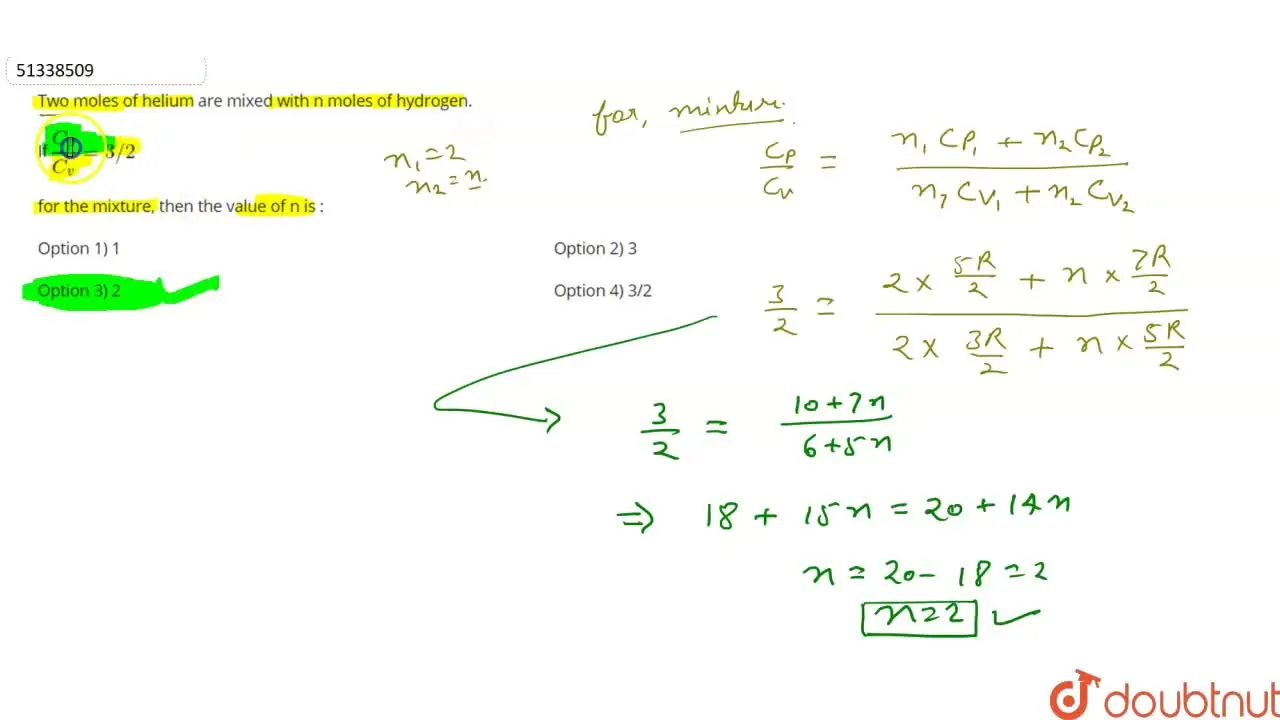Two moles of helium are mixed with n moles of hydrogen. If CpCv=32 for the mixture, then the value of n is :
1
2
3
3/2
The correct Answer is:B
Step by step video, text & image solution for Two moles of helium are mixed with n moles of hydrogen. If (Cp)/(Cv)=(3)/(2) for the mixture, then the value of n is : by Physics experts to help you in doubts & scoring excellent marks in Class 12 exams.
Related Playlists
Similar Questions
Two mole of argon are mixed with one mole of hydrogen, then CpCV for the mixture is nearly
View SolutionTwo moles of helium (He) are mixed with four moles of hydrogen (H2). Find
(a) (CV of the mixture
(b) (CP of the mixture and
( c) (γ)of the mixture.View SolutionTwo moles of helium are mixed with n moles of hydrogen. The root mean spure (rms) speed of the gas molecules in the mexture is √2 times the speed of sound in the mixture. Then value of n is
View SolutionFive moles of helium are mixed with two moles of hydrogen to form a mixture. Take molar mass of helium M1=4g and that of hydrogen M2=2g
The equivalent molar mass of the mixture isView SolutionFive moles of helium are mixed with two moles of hydrogen to form a mixture. Take molar mass of helium M1=4g and that of hydrogen M2=2g
The equivalent degree of freedom f of the mixture isView SolutionFive moles of helium are mixed with two moles of hydrogen to form a mixture. Take molar mass of helium M1=4g and that of hydrogen M2=2g
The equivalent of γ isView SolutionFive moles of helium are mixed with two moles of hydrogen to form a mixture. Take molar mass of helium M1=4g and that of hydrogen M2=2g
If the internal energy of He sample is 1000J and that of the hydrogen sample is 200J , then the internal energy of the mixture isView Solution2 moles of monoatomic gas are mixed with "1" mole of a diatomic gas.Then "y" for the mixture is:
View SolutionTwo moles of oxygen are mixed with eight moles of helium. The effective specific heat of the mixture at constant volume is
View SolutionTwo moles of helium gas is mixed with three moles of hydrogen molecules (taken to be rigid). The molar specific heat of mixture at constant volume is ______ (in J//mol//K)?(R = 8.3 J//mol K)
View Solution


